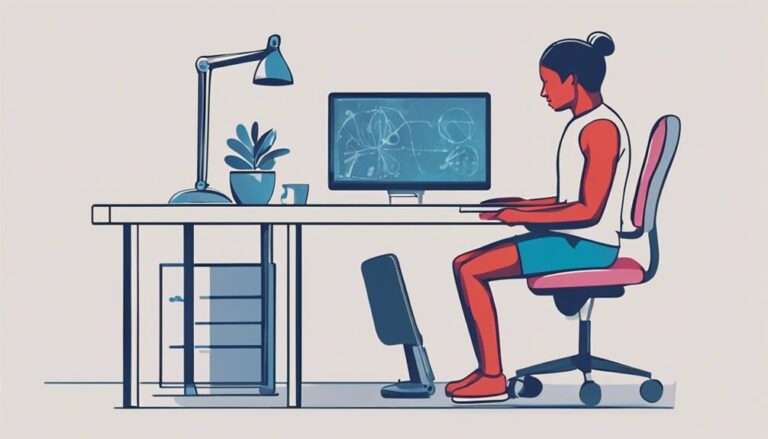How Can I Reduce Anxiety Naturally?
Imagine anxiety as a dark cloud looming overhead, casting shadows over your every move. But fear not, there are ways to let the sun break through.
By incorporating simple yet effective strategies into your daily routine, you can take steps towards a calmer, more peaceful state of mind.
From mindful practices to herbal supplements, the path to easing anxiety naturally might be closer than you think.
Key Takeaways
- Practice mindfulness and relaxation techniques like meditation and deep breathing.
- Engage in physical activity such as yoga and cardio for anxiety management.
- Consider dietary adjustments like adding Omega-3 fatty acids and limiting caffeine.
- Seek social support through peer counseling and online mental health forums.
Mindfulness Practices
To reduce anxiety naturally, start incorporating mindfulness practices into your daily routine. Mindfulness involves being present in the moment, which can help alleviate stress and promote a sense of calm.
One way to practice mindfulness is through mindful eating. When you eat, focus on the flavors, textures, and sensations of each bite. This can help you appreciate your food more and prevent overeating due to stress or emotional triggers.
Meditation is another powerful tool for reducing anxiety. Taking just a few minutes each day to sit quietly and focus on your breath can help quiet the mind and relax the body. Self-care techniques such as taking a warm bath, going for a walk in nature, or practicing yoga can also promote mindfulness and reduce anxiety levels.
Incorporating these mindfulness practices into your daily routine can have a significant impact on your overall well-being. By being more present and attentive in your daily activities, you can reduce stress and anxiety, leading to a greater sense of peace and balance in your life.
Relaxation Techniques
If you're looking for effective ways to calm your mind and body, consider trying breathing exercises and progressive muscle relaxation. These techniques can help you ease tension, reduce anxiety, and promote a sense of calm.
Incorporating them into your daily routine can be a simple yet powerful way to manage stress naturally.
Breathing Exercises
Practice these calming breathing exercises to help ease your anxiety and promote relaxation.
Take a moment to focus on your breath. Inhale slowly through your nose, feeling your lungs expand, hold for a few seconds, then exhale gently through your mouth. Repeat this process several times. Calming breaths like these can signal to your body that it's time to relax, triggering a relaxation response that counters stress.
Another effective technique is diaphragmatic breathing – breathe in deeply through your nose, letting your belly expand, then exhale slowly. This type of deep breathing can reduce the production of stress hormones and increase feelings of calmness.
Progressive Muscle Relaxation
Ease your anxiety further by incorporating Progressive Muscle Relaxation into your relaxation routine. This technique involves tensing specific muscle groups in your body for a few seconds and then releasing the tension, promoting stress management and reducing muscle tension. By practicing Progressive Muscle Relaxation regularly, you can learn to differentiate between the feeling of tension and relaxation in your body, helping you release stress and anxiety more effectively. Here is a simple guide to help you get started:
| Muscle Group | Tense | Relax |
|---|---|---|
| Hands and Forearms | Clench your fists tightly for 5 seconds | Release the tension, letting your hands and fingers go limp |
| Forehead | Raise your eyebrows as high as possible | Lower your eyebrows, smoothing out any lines |
| Shoulders | Shrug your shoulders up towards your ears | Drop your shoulders down, feeling the tension melt away |
Exercise and Physical Activity
Feeling anxious?
Understand that exercise can be a powerful tool in managing your anxiety.
Learn about the benefits of physical activity and explore various types of exercises that can help you reduce stress and elevate your mood.
Start incorporating movement into your routine to experience the positive impact it can have on your overall well-being.
Benefits of Exercise
Regular physical activity offers numerous benefits beyond physical health. It can help reduce anxiety levels naturally. Engaging in activities like yoga, with its combination of physical poses, controlled breathing, and meditation, can be particularly beneficial for mental health. Yoga can calm the mind, reduce stress, and improve overall well-being. Cardio workouts, such as running, swimming, or cycling, are also known for their stress-relieving effects. These activities trigger the release of endorphins, which act as natural painkillers and mood elevators. Endorphins can alleviate anxiety and promote relaxation. By incorporating both yoga and cardio exercises into your routine, you can effectively manage anxiety in a natural and holistic manner.
Types of Physical Activity
To effectively maintain your physical health and reduce anxiety levels naturally, it's essential to explore various types of physical activities that suit your preferences and lifestyle.
Engaging in outdoor activities like hiking or cycling can help you connect with nature and clear your mind. Yoga practice offers not only physical benefits but also promotes relaxation and mindfulness. Dance therapy is a fun way to express yourself while improving your mood and reducing stress.
Additionally, incorporating strength training into your routine can boost your confidence and overall well-being. Remember, finding activities that you enjoy is key to staying consistent and reaping the mental health benefits of physical exercise. Experiment with different types of activities to discover what works best for you.
Dietary Changes
Consider adding more whole foods and green vegetables to your daily meals to support your journey in reducing anxiety naturally. Maintaining a nutritional balance is crucial for your overall well-being, including your mental health. When it comes to dietary changes to help manage anxiety, focus on incorporating mood foods that can positively impact your emotions and stress levels.
Here are some practical tips to guide you:
- Include Omega-3 Fatty Acids**: Foods rich in Omega-3, such as salmon, walnuts, and flaxseeds, are known to support brain health and reduce anxiety symptoms.
- Opt for Leafy Greens: Incorporating leafy green vegetables like spinach, kale, and broccoli into your meals can provide essential nutrients that support a healthy nervous system.
- Choose Whole Grains**: Whole grains like quinoa, brown rice, and oats can help stabilize blood sugar levels and promote a steady mood throughout the day.
Making these simple dietary adjustments can have a positive impact on your anxiety levels and overall mental well-being.
Herbal Supplements
Adding to your journey of reducing anxiety naturally through dietary changes, exploring the benefits of herbal supplements can provide additional support in managing your anxiety symptoms effectively. Herbal remedies have been used for centuries to promote relaxation and ease anxiety symptoms. While there are natural alternatives available, it's essential to understand the potential risks associated with herbal supplements and consult with a healthcare provider before incorporating them into your routine.
Here is a table outlining some common herbal supplements used for anxiety and their potential benefits:
| Herbal Supplement | Potential Benefits |
|---|---|
| Chamomile | Relaxation and Calmness |
| Lavender | Stress Reduction |
| Valerian | Improved Sleep Quality |
| Passionflower | Anxiety Relief |
Scientific evidence supporting the effectiveness of herbal supplements for anxiety varies, with some studies showing positive results while others require further research. It's crucial to approach herbal remedies with caution, considering individual differences in responses and any possible interactions with existing medications. Always prioritize safety and consult a healthcare professional before starting any new supplement regimen.
Quality Sleep
Ensuring you get quality sleep is essential for maintaining your overall well-being and managing anxiety effectively. Quality sleep can significantly impact your mental health and reduce feelings of anxiety.
Here are some practical tips to help you improve the quality of your sleep:
- Establish a Sleep Routine: Creating a consistent bedtime routine signals to your body that it's time to wind down and prepare for sleep.
- Practice Good Sleep Hygiene: This includes ensuring your sleep environment is conducive to rest, such as keeping your room dark, quiet, and cool.
- Try Relaxation Techniques: Engaging in relaxation techniques like mindfulness meditation before bed can help calm your mind and body, making it easier to fall asleep.
Social Support
Having a strong support system can significantly impact your ability to manage anxiety effectively and improve your overall well-being. Seeking peer counseling or participating in group therapy sessions can provide you with a safe space to share your feelings and experiences with others who may be going through similar struggles.
Connecting with community resources or engaging in online forums dedicated to mental health can also be beneficial. These platforms offer opportunities to interact with individuals who understand what you're going through and can offer valuable insights and support.
Conclusion
In conclusion, reducing anxiety naturally is possible through mindfulness practices, relaxation techniques, exercise, dietary changes, herbal supplements, quality sleep, and social support.
Did you know that according to the Anxiety and Depression Association of America, anxiety disorders are the most common mental illness in the U.S., affecting 40 million adults every year?
By incorporating these strategies into your daily routine, you can take control of your anxiety and improve your overall well-being. Remember, you aren't alone in this journey.






